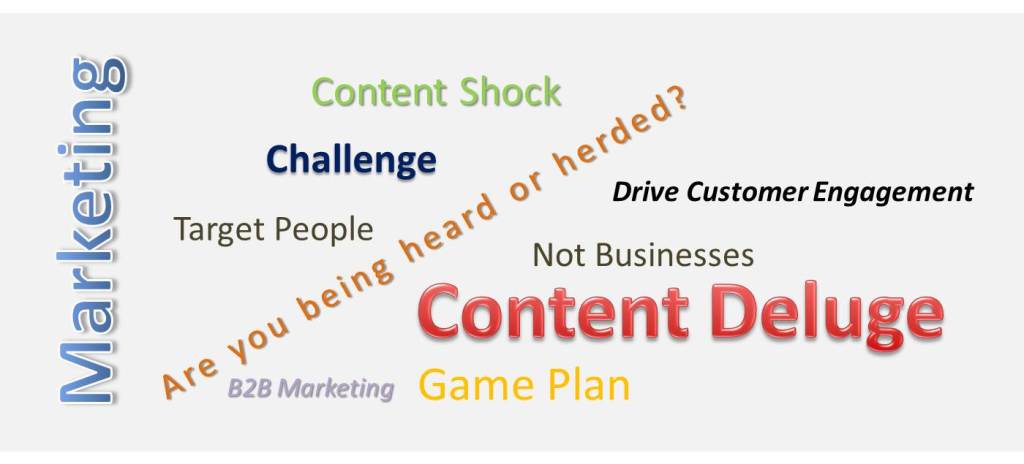 “A wealth of information creates a poverty of attention.” Herbert Simon, Social Scientist
“A wealth of information creates a poverty of attention.” Herbert Simon, Social Scientist
No matter which trends or statistics you read regarding content marketing, the signals are clear – everybody’s doing it and we’re all looking to do more of it. But I question, is this content marketing trend sustainable or are we being inundated by a content deluge? And while there is certainly merit to the discussion of the consequences of target audiences being overwhelmed by “crap content,” what are the alternatives for marketers beyond focusing on the quality of our content?
In today’s information-rich era, where buyers have increasingly higher expectations of easily accessible content, marketers simply cannot afford to neglect this vital aspect of their strategy. The key to thriving in the Content Deluge lies in producing only material of the highest quality, which is precisely targeted to the right audience at the right time and in the right manner. To this end, here are three key components to address to ensure that your content doesn’t suffer from a “poverty of attention,” and get lost in the noise:
Define a game plan
The latest numbers from MarketingProfs and the Content Marketing Institute’s (CMI) 2015 content marketing trend report show that while few respondents report having a defined, documented content marketing strategy, those who do are more effective in all aspects of their content marketing. By developing an integrated, cohesive strategy around highly-targeted, purpose-driven content appropriate for the various buying stages, you can more effectively connect prospects with your offering. Here are two resources to help you structure this effort:
- CMI’s “Build a Successful Content Marketing Strategy in 7 Steps” This guide represents CMI’s collective wisdom from working with many successful brands to help them “operationalize the process of content marketing.”
- Forrester’s “Message Framework” , which helps you consistently create and maintain content that serves the needs of both your audience and your sales team, by ensuring the right message for the right audience at the right time and in the right place.
Quality, not quantity
Great content is inherently more findable, having a tendency to naturally rise above the noise. Timely, relevant, and entertaining content are the tried and true means of capturing attention. However, you can engage your audience more effectively by:
- Keeping your message clear and focused (read Simplifying the Complex Sale)
- Telling a better story (read Inciting Buying Decisions: Creating a change imperative story)
- Appealing to innate preferences regarding how we absorb, process, and retain information (read The Power of Visual Communication)

Target people, not businesses
Learn who your buyer is as a person, not just as a functional role within a prospective business. Focusing on personalization renders your content more meaningful and relevant. To do this effectively, you need to ‘be the buyer’ – learn what motivates them. What are their needs, challenges, perspectives, influences, concerns? What do they most value? What affects them emotionally (a key aspect in motivation)? Here are some resources to dig deeper into ‘the how’ of achieving greater resonance on a personal level:
- Create actionable customer profiles with consideration for the social and emotional aspects important to differentiation
- Use psychographics and emotionally compelling content to drive behavior
- Incorporate the human element into your digital content deployment
As a final thought, I would be remiss in not pointing out the value an account-based survey can provide to drive customer engagement. Surveys are a great way to both listen to individual prospects and to gain the collective pulse of your target audience – invaluable intelligence for content creators to form a personalized approach, as well as achieve the broader perspective.
Explore the topic further:
Content Shock: Why content marketing is not a sustainable strategy
Crap: Why the single biggest threat to content marketing is content marketing
Content Shock: Worrisome Trend or Content Marketing Myth?
B2B Content Marketing: 2015 Benchmarks, Budgets, & Trends – North America
